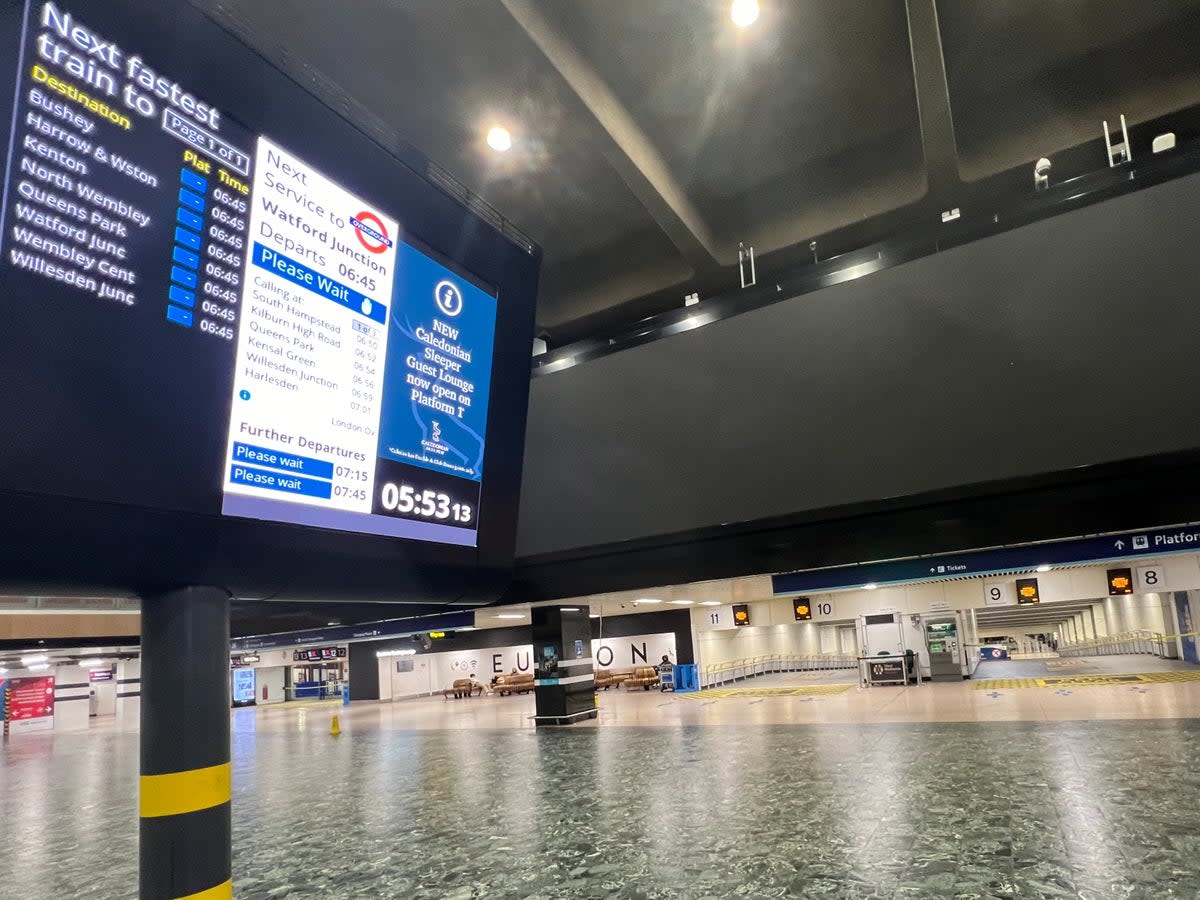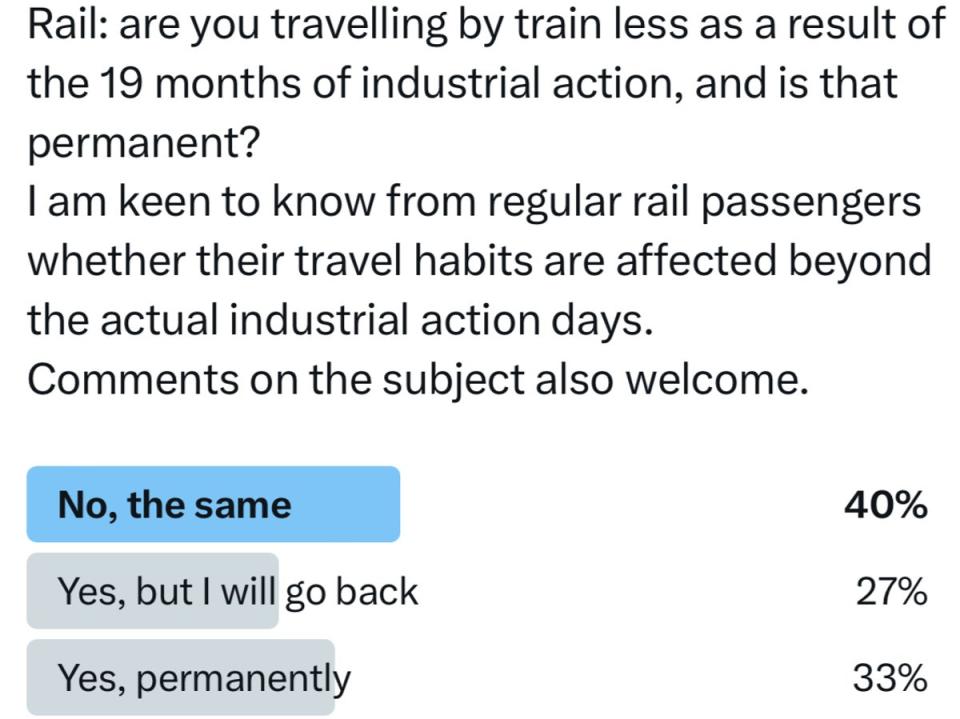One in three passengers will use trains less following rail strikes

One in three regular rail passengers say they are travelling by train less often due to the frequent strikes – and that their travel patterns have changed permanently.
They were responding to a snap social media poll conducted by The Independent on the last day of the latest walk-outs by train drivers belonging to the Aslef union. A total of 2,142 people voted in the four-hour poll on X, formerly Twitter.
The largest response – 40 per cent – was from people who say they are travelling by rail just as much as before on days free of industrial action. A further 27 per cent say they are using trains less during the long and bitter dispute, but they plan to return to the railway once the industrial strife is over.
But 33 per cent – one in three respondents in the self-selecting poll – say the industrial action has changed their travel habits permanently.

One passenger, the travel marketing expert Steve Dunne, wrote: “I use rail much less these days than I used to – down 70 per cent on 2019.
“With the seemingly constant industrial and union disputes, strikes, work to rule, etc, and ever increasing fares, it makes rail travel too risky and fraught with worry. I mainly do virtual meetings or drive these days.”
Jim Darroch wrote: “I live in Edinburgh and have cut back on train travel as I don't trust them to run. Could've gone to Manchester, Cornwall, York, etc, but it's too risky. Not just strikes, also the pathetic service level of CrossCountry and TransPennine Express.”
Among the two out of five passengers who are travelling the same amount, Phil Read wrote: “I'm a regular rail user for leisure and the industrial action has not changed my travel habits at all.
“They are planned in advance and give lots of notice to make other arrangements. It's the last-minute cancellations caused by the crumbling infrastructure that angers me.
The blogger “Travel Lexx” added: “With GWR being in what can sometimes can only be described as complete disarray due to track/signalling/whatever else problems, it is tough going sometimes!”
Neil Williams is among the 27 per cent who say they will return to the same level of rail use once the dispute is settled. He wrote: “Yes, using the car a lot more. I'll go back once resolved.” But he added that if a move by LNER to scrap off-peak flexible tickets goes nationwide, he would l probably stop long-distance rail travel almost entirely.
“I value flexibility and the off peak single/return are the tickets I use most,” he wrote.
Train drivers have been striking intermittently since July 2022 in a row over pay and working arrangements. The staff demand a no-strings rise, while the government insists that even a modest pay increase is contingent on radical changes to long-standing working arrangements – such as making Sunday part of the working week at all operators.
One of the most damaging days in the latest round of industrial action was Sunday 4 February. Thousands of trains were cancelled as operators such as Chiltern and West Midlands Railway – who depend on drivers working overtime to cover Sunday schedules – closed their networks.
Members of Aslef have been staging a nine-day overtime ban together with “rolling” regional strikes, designed to cause maximum disruption with minimum loss of pay.
Aslef’s charter calls for “the elimination of institutionalised overtime” – along with an average 32-hour working week and pensions equal to final salary.
As the latest tranche of industrial action ends, the parties involved are no closer to an agreement.
The Independent asked Aslef, the Department for Transport (DfT) and the Rail Delivery Group (RDG), representing the 14 English train operators involved in the dispute, the same question: “Is the dispute between train drivers, rail firms and the government any closer to a settlement?”
Within two minutes, the union responded with a single word: “No.”
A DfT spokesperson said: “The transport secretary and rail minister have already facilitated talks with Aslef, leading to a fair and reasonable offer being made that would increase the average train driver's salary to £65,000 – an offer which remains on the table.
“The government has overseen deals with the RMT, TSSA and Unite, delivering their members a fair and reasonable pay rise. Aslef remains the only rail union that is continuing to deny their members a pay rise by not putting the offer on the table to a vote.”
The union says no talks with ministers have taken place for over a year, and that train drivers have voted overwhelmingly to continue industrial action – effectively a rejection of the offer.
A spokesperson for the RDG said: “There are no winners from these strikes that have caused disruption to our customers. We believe rail can have a bright future, but right now taxpayers are contributing an extra £54 million a week to keep services running post-Covid.
“Aslef’s leadership need to recognise the financial challenge facing rail. Instead of staging more damaging industrial action, we call on the Aslef leadership to work with us to resolve this dispute and deliver a fair deal which both rewards our people, and makes the changes needed to make services more reliable.”
Meanwhile, “Shabiz” concluded: “I’m not travelling less on the rail because of the strikes, I’m travelling less because it’s become such an unreliable means of transport.”
The National Infrastructure Commission has published research on the long-term effects of transport strikes. A paper said: “Studies on the impacts of London Tube strikes in 2015 showed how even a one-day strike action triggered long-term changes in travel demand.
“The disruption forced commuters to find alternative routes and travel modes as Tube lines stopped running or operated on severely reduced service frequencies.
“Around 5 per cent of commuters made long-term changes to regular travel routes.”

 Yahoo News
Yahoo News 
